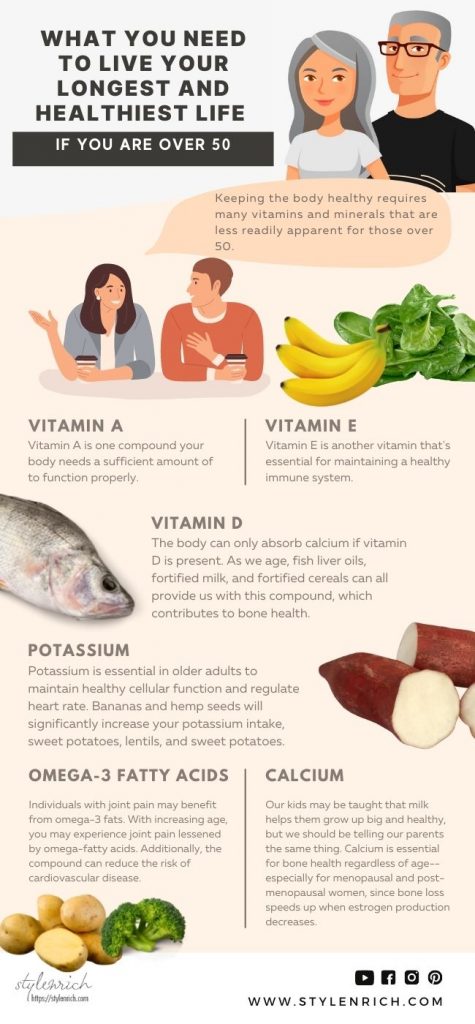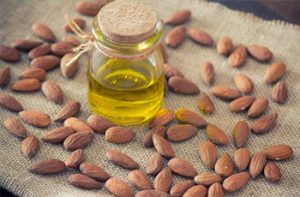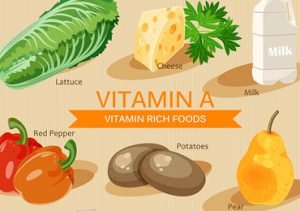Living a long, healthy life is always dependent on taking good care of your body, no matter your age. While self-care remains essential, the way it’s practiced can vary with age. Consider switching to a lower-impact workout and boosting your metabolism. Living a long healthy life for over 50s, requires many vitamins and minerals that are less readily apparent for those over 50.
We need specific vitamins and minerals to ensure that our bodies function correctly at all stages of our lives – digestion, energy conversion, as well as skin and hair health. However, as we age, we may absorb less of these compounds. In addition, doctors may suggest older patients pay extra attention to certain kinds of nutrients. In reality, most people can get all the nutrients they need through regular healthy diets rather than needing vitamin supplements or compounds as they age.

Healthy life with Vitamin A
Vitamin A is one compound your body needs a sufficient amount of to function properly, so to boost your intake, choose fruits and vegetables high in Vitamin A, such as carrots and mangoes. Many foods contain vitamin A, a fat-soluble nutrient. The immune system, reproduction, and normal vision are all dependent on vitamin A. In addition to the heart, lungs, kidneys, and other organs, vitamin A helps them function properly.
Vitamin B6
It becomes increasingly crucial to protect our bodies from disease as we age. The role of vitamin B6 in this function is vital, which is why doctors recommend that elderly individuals take in more of this particular nutrient. B6 is abundantly found in potatoes, fish, liver, and other starchy vegetables. In addition to promoting proper brain development and immune function, vitamin B-6 (pyridoxine) is essential for maintaining a healthy nervous system. In addition to poultry, fish, potatoes, chickpeas, bananas, and fortified cereals, vitamin B-6 is also found in poultry.
Vitamin B12
Age-related problems in vitamin B12 absorption have been found in some studies. A variety of foods offer this vital vitamin, which helps keep your blood cells healthy. Some fortified cereals, fish, and poultry are also good sources. The nutrient B12 is essential for the health of your blood and nerve cells, as well as for making DNA. It reduces the risk of megaloblastic anemia, which causes tiredness and weakness.
Vitamin D
The body can only absorb calcium if vitamin D is present. As we age, fish liver oils, fortified milk, and fortified cereals can all provide us with this compound, which contributes to bone health. Besides aiding calcium absorption, vitamin D helps maintain brain health, bone health, heart health, and immunity. As a result of sunlight exposure, your body can also produce it when you consume foods that contain it.
Vitamin E
Vitamin E is another vitamin that’s essential for maintaining a healthy immune system. Nuts like almonds, as well as legumes like peanuts, contain this compound. Broccoli and spinach are also foods with vitamin E you’ll want to buy for your family. The effects of vitamin E supplements may include:
Lowering the risk of cancer.
Preventing coronary heart disease.
Promoting immune function.
Preventing inflammation.
Improving eye health.
Vitamin E supplementation is not for everyone, as research regarding its benefits has been mixed.
Magnesium
Magnesium is essential for maintaining healthy blood sugar levels, blood pressure levels, and muscle and nerve function. As a result, you should include plenty of leafy greens and whole grains in your diet.
Magnesium is vital to nerve and muscle function, as well as energy production in the body. The short-term effects of low magnesium levels are not noticeable. The risk of osteoporosis, high blood pressure, heart disease, and type 2 diabetes can increase with chronically low magnesium levels.
Potassium
Potassium is essential in older adults to maintain healthy cellular function and regulate heart rate. Bananas and hemp seeds will significantly increase your potassium intake, sweet potatoes, lentils, and sweet potatoes.
Healthy Life with Calcium
Our kids may be taught that milk helps them grow up big and healthy, but we should be telling our parents the same thing. Calcium is essential for bone health regardless of age–especially for menopausal and post-menopausal women, since bone loss speeds up when estrogen production decreases.
Healthy life with Omega-3 fatty acids
Individuals with joint pain may benefit from omega-3 fats. With increasing age, you may experience joint pain lessened by omega-fatty acids. Additionally, the compound can reduce the risk of cardiovascular disease.


















Enjoyed reading the article above , really explains everything in detail